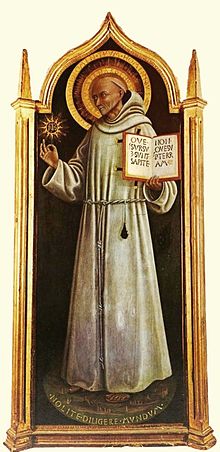
Saint Bernardine of Siena (+1444) was a fiery, implacable Franciscan friar, whose apostolic work was during the tumultuous first half of the 15th century, when immorality was rife, and the Church had stumbled into schism, with three rival claimants to the papacy in what we now know of as the Great Western Schism in 1378, two years before our saint’s birth.
His sermons – despite his apparently raspy voice – drew thousands, as he preached throughout Italy, inveighing against vices, with his exhortations sometimes ending, if particularly eloquent we may presume, with a ‘bonfire of the vanities’, the townspeople casting into the flames all those occasions of sin, such things as vanity mirrors, high-heeled shoes, perfumes, decks of cards (gambling was an inveterate vice ruining many). I wonder what he would say today of smartphones, televisions and contraceptives?
On that note, Bernardine is described on his Wikipedia page as being ‘homophobic’ for his insistent condemnation of ‘sodomy’. We should be aware that sodomy for the scholastic mind means any sexual act that is deliberately dissociated from its procreative signification and purpose, that is, one sought only for illicit pleasure or domination: Thus, sodomy included not only homosexual liasons, so to speak, but also contraception, masturbation and other such things, of varying degrees of moral gravity. Hence, Bernardine’s warning could be applied today with even greater relevance: You don’t understand that [sodomy] is the reason you have lost half your population over the last twenty-five years”
And we have likely lost a lot more than half our population over the past fifty or so years, due to various widespread practices of ‘sodomy’. Ponder the precipitously low birthrate of the United States (which had been holding its own until recently), now joining the demographic death spiral across the globe, with a few exceptions (almost all in Africa, where religion is also not surprisingly booming, for the primary reason for humans to have children is supernatural, transcendent of the pleasures and exigencies of one’s own fleeting life).
There is also the rather vague and inaccurate charge of ‘anti-Semitism’, in Bernardine’s advocacy of the segregation of Jews from the Catholic population. There are complex historical and cultural reasons for this policy of non-integration – leading to such entities as Jewish ‘ghettoes’ – one of which was the practice of usury, attributed to certain Jewish financiers. Living amongst those of one’s own faith and culture is rather natural – witness our own demographic dispositions – but to enforce such a custom seems to us now rather odd. But we must be careful in judging the past from the principles of the present.
In all, Bernardine lived a holy, ascetical life, and was known for his kindness and charity. He is most famed for propagating devotion to the Holy Name of Jesus which, as Scripture reminds us more than once, is a name of great power and reverence, to which ‘every knee must bend, in heaven, on earth and under the earth’. To remind his listeners, he also spread devotion to the monogram IHS, which are the first three letters in Greek of the Holy Name, as well as an acronym, ‘in hoc signo’, in this sign, you will conquer.
And what was true then, is true now, for only in the name of the Holy One will we overcome the evil one, who still, perhaps more than ever, prowls the world seeking the ruin of souls.
Sancte Bernardinus, ora pro nobis.
